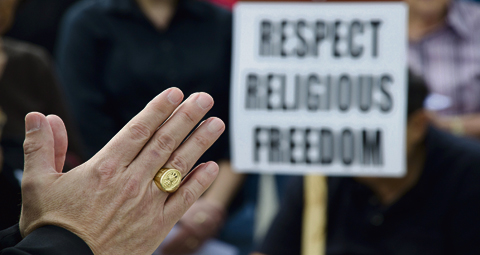
The attorneys at Nardone Limited regularly assist our clients with labor, employment, and human resource issues, including guidance on preventing and responding to discrimination and harassment charges filed with the Equal Employment Opportunity Commission (“EEOC”) or the Ohio Civil Rights Commission (“OCRC”). Our previous articles, “Religious Discrimination and Accommodation in the Workplace” and “Sincerely-Held Religious Beliefs and Practices in the Workplace” will help you gain a better understanding of the legal obligations an employer has to accommodate its employees and applicants’ sincerely-held religious practices and beliefs. Title VII of the Civil Rights Act of 1964, 42 U.S.C. § 2000e, et seq., as amended (“Title VII”) makes it unlawful for an employer to discriminate against any individual based on an individual’s religion or other protected class covered in Title VII. Discrimination based upon an individual’s religion can take a number of different forms including disparate treatment, harassment, segregation, and retaliation. Examples of how these different forms of religious discrimination can occur in the workplace are as follows:
Disparate Treatment
Disparate treatment based on religion occurs when an individual is treated differently from others based upon the individual’s religious beliefs or practices. 41. C.F.R. 60-3.11. Disparate treatment is prohibited in recruitment, hiring, promoting, determining benefits, job training, job duties, termination, and any other aspect of an individual’s employment. For instance, an employer must not exclude someone from a job based on discriminatory religious preferences. But, an exception to this rule is that religious organizations may prefer members of their own religion for positions which are religious in nature.
In a recent United States Supreme Court decision, the court held that an employee or applicant no longer has to show that the employer had actual knowledge of the potential employee’s need for an accommodation in order to establish disparate treatment. It is only necessary to show that the employee or applicant’s need for an accommodation was a motivating factor in the employer’s decision. See EEOC v. Abercrombie & Fitch Stores, Inc., 135 S. Ct. 2028, (2015). This is significant, because an employer, who has actual knowledge of the need for an accommodation, does not violate Title VII by refusing to hire, recruit, promote, etc., an employee or applicant, if avoiding the accommodation is not the employer’s motive. For additional information on EEOC v. Abercrombie & Fitch Stores, Inc., you can find the full case here.
Harassment
Religious discrimination in the workplace may occur when an employee is: (i) required or coerced to abandon, alter, or adopt a religious practice as a condition of employment or (ii) subjected to unwelcome statements or conduct based on religion, including offensive remarks and verbal or physical mistreatment motivated by the victim’s religious beliefs or practices. Although isolated trivial incidents are not prohibited, such harassing conduct rises to the level of illegal harassment when it is so frequent or severe that it creates a hostile or offensive work environment or when it results in an adverse employment action. An employer is liable for such religious harassment by co-workers and third parties where the employer knew or should have known about the harassment and failed to take prompt and appropriate corrective action.
Segregation
Religious segregation occurs when employees are physically isolated from other employees or the employer’s customers or clients because of the employee’s religious practice or belief. This is illegal. For instance, an employer may not assign an employee to a “non-customer contact” position based upon the employer’s knowledge or belief that the particular employee’s religious garb or grooming: (i) may negatively impact client/customer relations or (ii) illicit a negative reaction from clients/customers. An employer making such a decision to isolate an employee is illegal.
Retaliation
Retaliation, based upon religious preferences or beliefs, occurs when an employer takes an adverse action against an individual because they engage in a protected activity, such as: (i) reporting an allegation of discrimination based upon religion to the employer; or (ii) requesting a religious accommodation.
For purposes of this article on forms of religious discrimination and as other related forms of discrimination and harassment in the workplace, examples of adverse actions include: (i) termination; (ii) refusal to hire; (iii) denial of a promotion; and (iv) unjustified negative evaluations.
Contact Nardone Limited
Nardone Limited has conducted many discrimination and harassment investigations for clients and has also defended clients against discrimination and harassment charges filed with the EEOC and the OCRC. Any of the above charges could be the result of a disgruntled current or former employee seeking revenge. All employers must ensure that they are complying with federal and state anti-discrimination law and taking the necessary measures to prevent actions that would violate Title VII, including: (i) Responding to and Preventing Claims of Harassment in the Dental Office- Part 1; (ii) Responding to and Preventing Claims of Harassment in the Dental Office- Part 2; (iii) Responding to and Preventing Claims of Harassment in the Dental Office- Part 3; and (iv) How Training Can Prevent Claims of Harassment in the Dental Office. If you would like more information on the EEOC or the OCRC, or need advice or representation in an employment dispute, contact either Tanya Nardone or Christopher Tackett, our employment/discrimination attorneys.